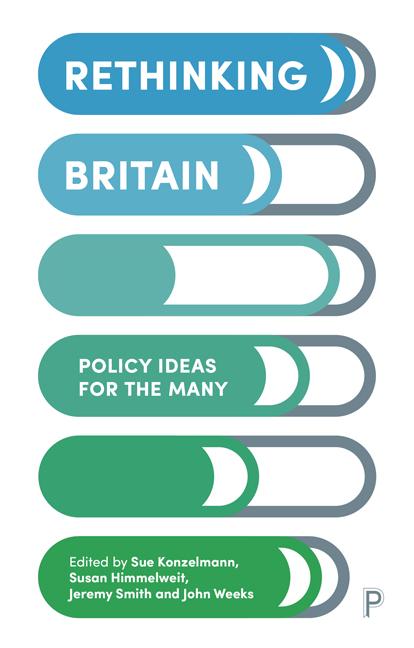Book contents
- Frontmatter
- Contents
- List of Tables and Figures
- The Contributors
- Foreword
- Introduction
- Interlude: ‘Mirror, Mirror, On the Wall – Who has the Highest Debt of All?’
- Part One Building a Full-Employment Economy: Introduction
- Part Two Public Investment – Prioritising Society Rather than Profit: Introduction
- Part Three Making Finance Work for Society: Introduction
- Part Four Genuine Social Security: Introduction
- Part Five How to provide for Social Needs: Introduction
- Conclusion
- Jargon Busters
- References and Further Reading
- Index
4 - How can Citizens’ Wealth Funds Address the Problem of Inequality?
Published online by Cambridge University Press: 11 March 2021
- Frontmatter
- Contents
- List of Tables and Figures
- The Contributors
- Foreword
- Introduction
- Interlude: ‘Mirror, Mirror, On the Wall – Who has the Highest Debt of All?’
- Part One Building a Full-Employment Economy: Introduction
- Part Two Public Investment – Prioritising Society Rather than Profit: Introduction
- Part Three Making Finance Work for Society: Introduction
- Part Four Genuine Social Security: Introduction
- Part Five How to provide for Social Needs: Introduction
- Conclusion
- Jargon Busters
- References and Further Reading
- Index
Summary
What's the issue?
Although the question of inequality has been moving up the political agenda, this has yet to translate into actual policy action. The UK continues to sit near the top of the global inequality league, with its deepening economic divide set to continue to widen, with grave consequences for both social and economic stability.
Can citizens’ wealth funds inject a pro-equality force into the economy?
Analysis
Rising inequality has been driven by two key trends: (1) the steady rise in the share of national income accruing to capital at the expense of labour; and (2) the concentration in ownership of capital and other forms of wealth. The returns from wealth (dividends, rent and interest) therefore go disproportionally to the already well-off.
The impact on inequality of the rising capital share has largely depended on the political and economic system. In the UK and the US, with their marked dominance of private capital, antipathy to collective ownership and high capital concentration, a rising capital share has translated into higher inequality. By contrast, in those countries where capital is more equally distributed, there has been a weaker, if still upward, impact on inequality.
Changing this primary source of inequality requires, among other policies, the deconcentration of capital ownership through measures that bring a more even distribution of wealth and its gains. One possibility would be to expand the role of alternative ownership forms – from partnerships to cooperatives, which distribute economic gains more equally; another would be via the increased taxation of wealth.
One of the most effective instruments for tackling inequality would be the creation of one or more citizens’ wealth funds. These are collectively held financial funds, communally owned, and used for the wider benefit of society. Their creation would raise the share of national wealth that is collectively owned, which is currently about one-tenth, compared to a quarter during the post-war era.
By increasing the share of national wealth that is held in common, such funds would bring a new ‘fundamental force for convergence’, a potentially powerful pro-equality instrument. They could play a key role in helping to construct a ‘shared capitalism’, where a rising part of the gains from economic activity are pooled and shared among all citizens and, crucially, across generations.
- Type
- Chapter
- Information
- Rethinking BritainPolicy Ideas for the Many, pp. 117 - 121Publisher: Bristol University PressPrint publication year: 2019



